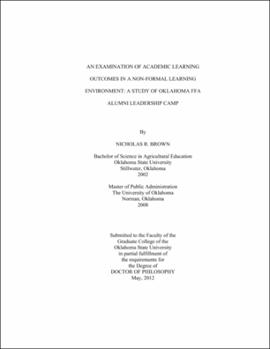| dc.contributor.advisor | Terry, Robert, Jr. | |
| dc.contributor.author | Brown, Nicholas R. | |
| dc.date.accessioned | 2013-11-26T08:22:17Z | |
| dc.date.available | 2013-11-26T08:22:17Z | |
| dc.date.issued | 2012-05 | |
| dc.identifier.uri | https://hdl.handle.net/11244/6554 | |
| dc.description.abstract | Scope and Method of Study: This quasi-experimental study included FFA members from 149 local Oklahoma FFA chapters who attended camp during summer of 2011. These subjects had completed at least the eighth grade, but had not yet graduated from high school. In all, 344 campers participated and were divided into four groups based upon their individual learning styles. | |
| dc.description.abstract | Findings and Conclusions: | |
| dc.description.abstract | 1. The typical Oklahoma FFA Alumni Camp attendee is a white, middle or upper class female, who maintains a good GPA. She has completed her sophomore year of high school, holds a local FFA chapter office, and is attending camp for the first time. | |
| dc.description.abstract | 2. As with the general population, camper learning styles are varied. | |
| dc.description.abstract | 3. On average, campers nearly doubled their score on the CCCE when comparing pretest and posttest results. It is important to note, however, that the average posttest score is a 58%, which would be a failing grade in a formal educational environment. | |
| dc.description.abstract | 4. Campers retain a small amount of the information taught during small group time at camp. | |
| dc.description.abstract | 5. Learning style does not affect the amount of information campers learn during small group breakout sessions. | |
| dc.description.abstract | 6. Learning style has no effect on the amount of information learned or retained by campers when comparing the mean scores of pretests, posttests, and delayed posttests. | |
| dc.description.abstract | 7. Overall, campers have a positive attitude toward camp. Two of the three construct scores were greater than 5.0, which means that campers had a positive attitude when asked to evaluate the camp and scale the activeness of the camp experience. | |
| dc.description.abstract | 8. Posttest scores are not affected by camper sex, race, grade level, previous camp attendance, or attitudes pertaining to camp. Scores are, however, affected by camper GPA, socioeconomic status, and FFA chapter officer status. | |
| dc.description.abstract | 9. Delayed posttest scores are not affected by camper sex, race, age, grade level, socioeconomic status, previous camp attendance, GPA, or attitude. However, campers who hold an FFA chapter office continued to out perform campers who did not hold an office. | |
| dc.format | application/pdf | |
| dc.language | en_US | |
| dc.rights | Copyright is held by the author who has granted the Oklahoma State University Library the non-exclusive right to share this material in its institutional repository. Contact Digital Library Services at lib-dls@okstate.edu or 405-744-9161 for the permission policy on the use, reproduction or distribution of this material. | |
| dc.title | Examination of academic learning outcomes in a non-formal learning environment: A study of Oklahoma FFA Alumni Leadership Camp | |
| dc.contributor.committeeMember | Kelsey, Kathleen D. | |
| dc.contributor.committeeMember | Robinson, J. Shane | |
| dc.contributor.committeeMember | Fuqua, Dale | |
| osu.filename | Brown_okstate_0664D_12117.pdf | |
| osu.accesstype | Open Access | |
| dc.type.genre | Dissertation | |
| dc.type.material | Text | |
| dc.subject.keywords | agricultural education | |
| dc.subject.keywords | camp | |
| dc.subject.keywords | cognitive gain | |
| dc.subject.keywords | learning | |
| dc.subject.keywords | learning styles | |
| dc.subject.keywords | non-formal education | |
| thesis.degree.discipline | Agricultural Education | |
| thesis.degree.grantor | Oklahoma State University | |
